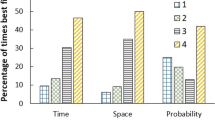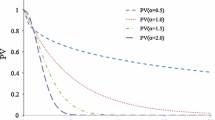Abstract
As anthropogenic influences on climate change become more readily apparent, the role of behavioral science in understanding barriers to sustainable actions cannot be overstated. Environmental psychologists have proposed that some major barrier to sustainability are the delayed, socially distant, and probabilistic effects of public policy efforts aimed at preserving Earth’s resources. This proposal places sustainability squarely within the research topic of delay, social, and probability discounting – processes well known to behavioral scientists. To date, there has been surprisingly little behavioral research examining the role of discounting processes in environmental decision making. In the present study, we examined the degree to which simple hyperbolic models of discounting can describe college students’ ratings of concern and their willingness to act in the face of an environmental loss. Findings suggest that hyperbolic models of delay, social, and probability discounting adequately describe these self-report data. Interestingly, but sadly unsurprisingly, ratings of willingness to act were discounted more steeply than concern across delay, social, and probability discounting tasks. A greater understanding of the behavioral processes associated with sustainability can inform better public policy efforts and may bridge the gap between environmental psychology and behavior analysis.


Similar content being viewed by others
Notes
Given the study was conducted at a large Midwestern university located in a town surrounded by rural land, and, thus, farms, we replaced Hendrickx and Nicolaij’s (2004) original wording of “garden” with “farm.”
References
de Wit, H., Flory, J. D., Acheson, A., McCloskey, M., & Manuck, S. B. (2007). IQ and nonplanning impulsivity are independently associated with delay discounting in middle-aged adults. Personality and Individual Differences, 42, 111–121. doi:10.1016/j.paid.2006.06.026.
Du, W., Green, L., & Myerson, J. (2002). Cross-cultural comparisons of discounting delayed and probabilistic rewards. The Psychological Record, 52, 479–492.
Estle, S. J., Green, L., Myerson, J., & Holt, D. D. (2007). Discounting of monetary and directly consumable rewards. Psychological Science, 18, 58–63. doi:10.1111/j.1467-9280.2007.01849.x.
Gifford, R. (2011). The dragons of inaction: psychological barriers that limit climate change mitigation and adaptation. American Psychologist, 66, 290–302. doi:10.1037/a0023566.
Gifford, R., Scannell, L., Kormos, C., Smolova, L., Biel, A., Boncu, S., et al. (2009). Temporal pessimism and spatial optimism in environmental assessments: an 18-nation study. Journal of Environmental Psychology, 29, 1–12. doi:10.1016/j.jenvp.2008.06.001.
Green, L., & Myerson, J. (2004). A discounting framework for choice with delayed and probabilistic rewards. Psychological Bulletin, 130, 769–792. doi:10.1037/0033-2909.130.5.769.
Green, L., Fry, A. F., & Myerson, J. (1994). Discounting of delayed rewards: a life-span comparison. Psychological Science, 5, 33–36. doi:10.1111/j.1467-9280.1994.tb00610.x.
Green, L., Myerson, J., Lichtman, D., Rosen, S., & Fry, A. (1996). Temporal discounting in choice between delayed rewards: the role of age and income. Psychology and Aging, 11, 79–84.
Hardin, G. (1968). The tragedy of the commons. Science, 162, 1243–1248. doi:10.1126/science.162.3859.1243.
Hardisty, D. J., & Weber, E. U. (2009). Discounting future green: money versus the environment. Journal of Experimental Psychology: General, 138, 329–340. doi:10.1037/a0016433.
Hendrickx, L., & Nicolaij, S. (2004). Temporal discounting and environmental risks: the role of ethical and loss-related concerns. Journal of Environmental Psychology, 24, 409–422. doi:10.1016/j.jenvp.2004.12.001.
Johnson, M. W., & Bruner, N. R. (2012). The sexual discounting task: HIV risk behavior and the discounting of delayed sexual rewards in cocaine dependence. Drug and Alcohol Dependence, 123, 15–21. doi:10.1016/j.drugalcdep.2011.09.032.
Johnson, M. W., & Bruner, N. R. (2013). Test-retest reliability and gender differences in the sexual discounting task among cocaine-dependent individuals. Experimental and Clinical Psychopharmacology, 21, 277–286. doi:10.1037/a0033071.
Jones, B., & Rachlin, H. (2006). Social discounting. Psychological Science, 17, 283–286. doi:10.1111/j.1467-9280.2006.01699.x.
Jones, B., & Rachlin, H. (2009). Delay, probability, and social discounting in a public goods game. Journal of the Experimental Analysis of Behavior, 91, 61–73. doi:10.1901/jeab.2009.91-61.
Kaufman, D. S., Schneider, D. P., McKay, N. P., Ammann, C. M., Bradley, R. S., Briffa, K. R., et al. (2009). Recent warming reverses long-term arctic cooling. Science, 325, 1236. doi:10.1126/science.1173968.
Koffarnus, M. N., Jarmolowicz, D. P., Mueller, E. T., & Bickel, W. K. (2013). Changing delay discounting in the light of the competing neurobehavioral decision systems theory: a review. Journal of the Experimental Analysis of Behavior, 99, 32–57. doi:10.1002/jeab.2.
Locey, M. L., Jones, B. A., & Rachlin, H. (2013). Self-control and altruism. In G. J. Madden (Ed.), Handbook of behavior analysis (pp. 463–481). Washington, D.C.: American Psychological Association.
MacKillop, J., Amlung, M. T., Pryor, L. R., Ray, L. A., Sweet, L. H., & Munafo, M. R. (2011). Delayed reward discounting and addictive behavior: a meta-analysis. Psychopharmacology, 216, 305–321. doi:10.1007/s00213-011-2229-0.
Madden, G. J., & Bickel, W. K. (Eds.). (2010). Impulsivity: The behavioral and neurological science of discounting. Washington, DC: American Psychological Association.
Mann, M. E. (2012). The hockey stick and the climate wars: Dispatches from the front lines. New York: Columbia University Press.
Mann, M. E., Bradley, R. S., & Hughes, M. K. (1998). Global-scale temperature patterns and climate forcing over the past six centuries. Nature, 392, 779–787. doi:10.1038/nature02478.
Mazur, J. E. (1987). An adjusting procedure for studying delayed reinforcement. In M. L. Commons, J. E. Mazur, J. A. Nevin, & H. Rachlin (Eds.), Quantitative analyses of behavior: Vol. 5. The effect of delay and intervening events on reinforcement value (pp. 55–73). Hillsdale: Erlbaum.
Mazur, J. E. (2004). Risky choice: selecting between certain and uncertain outcomes. The Behavior Analyst Today, 5, 190–202.
Mazur, J. E., & Biondi, D. R. (2009). Delay-amount tradeoffs in choices by pigeons and rats: hyperbolic versus exponential discounting. Journal of the Experimental Analysis of Behavior, 91, 197–211. doi:10.1901/ jeab.2009.91-197.
McKerchar, T. L., & Renda, C. R. (2012). Delay and probability discounting in humans: an overview. The Psychological Record, 62, 817–834.
Odum, A. L., & Baumann, A. A. L. (2010). Delay discounting: State and trait variable (pp. 39-65). In G. J. Madden & W. K. Bickel (Eds.), Impulsivity: The behavioral and neurological science of discounting. Washington, DC: American Psychological Association.
Odum, A. L., Madden, G. J., & Bickel, W. K. (2002). Discounting of delayed health gains and losses by current, never- and ex-smokers of cigarettes. Nicotine & Tobacco Research, 4, 295–303. doi:10.1080/14622200210141257.
Ohmura, Y., Takahashi, T., & Kitamura, N. (2005). Discounting delayed and probabilistic monetary gains and losses by smokers of cigarettes. Psychopharmacology, 182, 508–515. doi:10.1007/s00213-005-0110-8.
Olson, E. A., Hooper, C. J., Collins, P., & Luciana, M. (2007). Adolescents’ performance on delay and probability discounting tasks: contributions of age, intelligence, executive functioning, and self-reported externalizing behavior. Personality and Individual Differences, 43, 1886–1897. doi:10.1016/j.paid.2007.06.016.
Pachauri, R. K., & Reisinger, A. (Eds.). (2007). Climate Change 2007: Synthesis report. Contribution of Working Groups I, II and III to the Fourth Assessment Report of the Intergovernmental Panel on Climate Change. Geneva: IPCC.
Rachlin, H., & Jones, B. A. (2008). Social discounting and delay discounting. Journal of Behavioral Decision Making, 20, 1–15. doi:10.1002/bdm.567.
Rachlin, H., Raineri, A., & Cross, D. (1991). Subjective probability and delay. Journal of the Experimental Analysis of Behavior, 55, 233–244. doi:10.1901/jeab.1991.55-233.
Rosenzweig, C., Karoly, D., Vicarelli, M., Neofotis, P., Wu, Q., Casassa, G., et al. (2008). Attributing physical and biological impacts to anthropogenic climate change. Nature, 453, 353–358. doi:10.1038/nature06937.
Scheres, A., Dijkstra, M., Ainslie, E., Balkan, J., Reynolds, B., Sonuga-Barka, E., et al. (2006). Temporal and probabilistic discounting of rewards in children and adolescents: effects of age and ADHD symptoms. Neuropsychologia, 44, 2092–2103. doi:10.1016/j.neuropsychologia.2005.10.012.
Shead, N. W., & Hodgins, D. C. (2009). Probability discounting of gains and losses: implications for risk attitudes and impulsivity. Journal of the Experimental Analysis of Behavior, 92, 1–16. doi:10.1901/jeab.2009.92-1.
Thompson, L. G. (2010). Climate change: the evidence and our options. The Behavior Analyst, 33, 153–170.
Weatherly, J. N., Plumm, K. M., & Derenne, A. (2011). Delay discounting and social policy issues. The Psychological Record, 61, 527–546.
Wewers, M. E., & Lowe, N. K. (1990). A critical review of visual analogue scales in the measurement of clinical phenomena. Research in Nursing & Health, 13, 227–236. doi:10.1002/nur.4770130405.
Whelan, R., & McHugh, L. A. (2010). Temporal discounting of hypothetical monetary rewards by adolescents, adults, and older adults. The Psychological Record, 59, 247–258.
Yoon, J. H., & Higgins, S. T. (2008). Turning k on its head: comments on use of an ED50 in delay discounting research. Drug and Alcohol Dependence, 95, 169–172. doi:10.1016/j.drugalcdep.2007.12.011.
Author information
Authors and Affiliations
Corresponding author
Appendix
Appendix
Example Environmental Discounting VAS Question

Rights and permissions
About this article
Cite this article
Kaplan, B.A., Reed, D.D. & McKerchar, T.L. Using a Visual Analogue Scale to Assess Delay, Social, and Probability Discounting of an Environmental Loss. Psychol Rec 64, 261–269 (2014). https://doi.org/10.1007/s40732-014-0041-z
Published:
Issue Date:
DOI: https://doi.org/10.1007/s40732-014-0041-z




